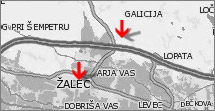KONTAKT
Šlandrov trg 20/a
3310 Žalec, Slovenija
tel.: +386 3 710 26 10
faks: +386 3 710 25 87

Natural mineral manure
It took many millions of years for ground formation and still changes continuous happen. Ground consists of four main components: mineral and organic substances, water and air.
The characteristics of garden soil, especially physical are frequently truncated and are far away from that, what we wish for. Soil is like a riddle. It is not capable to retain major amounts of humidity or nutriment. Only few days after the rain, soil must be watered. This happens particularly on light sand, weak humus ground. Such ground can be cultivated, water conductance is good, airing is intensive and plants can easy pierce with roots. The water quickly strains into groundwater and flows off into streams of water.
Natural zeolite meal and bentonite soil are names for sand form of natural stone with volcanic origin, which is being used in agriculture, farming and viticulture. Stone meals are especially effective because of their chemical and mineral structure, because of the large inner area and because of netlike (skeleton) structure, which enables binding and transmission of nutritive substances and water.
An important characteristic of stone meal is progressive loosening of plant nutrition elements. Stone meal retains easy liquefied substances, it connects and neutralizes them (it has got a neutralization value), simultaneously and as necessary they are always available to plants and microorganisms. Therefore stone meals are meditative and preservation means of nutrition substances in ground layers, simultaneously they prevent that those substances would be washed away into a deeper layer, where they wouldn’t be accessible for plants.
By mineral structure they are light zeolites, bentonites and mixed. The difference is particular in crystal structure of minerals, out of which defined characteristics are generated. Zeolite meal better retains nitrogen compounds (selective nitrogen adsorption); bentonite soil has the ability to bloat, with what large water amounts are connected and retained. For each ground kind it has to be determined, which stone meal suits the best.
BENTONITE SOIL
Bentonite soil is used on more sanded and easy permeable ground. Such ground can be cultivated. Because of its high adsorption ability bentonite soil can retain liquefied nutrition substances in the ground, which would be lost because of ablution. Therefore, nutrition substances stay in the ground and are longer available to plants. Organisms which live in the ground find with usage of bentonite soil in bentonite mineral structure good conditions for growth. With that ground is essential improved and harvest is increased on a natural way.
ZEOLITE MEAL
Zeolite meal is used on more heavily – argillaceous ground. In combination with basis fertilization and zeolite meal, the physical ground structure is being improved. On medium heavily argillaceous ground regular admixing of zeolite meal is referred. This consists of minimum 50 % natural zeolites and other minerals, like bauxites, flintstone, mica, illit and other. It contains also important elements like: Aluminium, Iron, Manganese, Calcium, Sodium, Potassium, Phosphorus, Zinc, and Copper…..
When we fortify ground with all those rich minerals and primaries, we get healthy plants, which reflect high defense power against pests.
The characteristics of garden soil, especially physical are frequently truncated and are far away from that, what we wish for. Soil is like a riddle. It is not capable to retain major amounts of humidity or nutriment. Only few days after the rain, soil must be watered. This happens particularly on light sand, weak humus ground. Such ground can be cultivated, water conductance is good, airing is intensive and plants can easy pierce with roots. The water quickly strains into groundwater and flows off into streams of water.
Natural zeolite meal and bentonite soil are names for sand form of natural stone with volcanic origin, which is being used in agriculture, farming and viticulture. Stone meals are especially effective because of their chemical and mineral structure, because of the large inner area and because of netlike (skeleton) structure, which enables binding and transmission of nutritive substances and water.
An important characteristic of stone meal is progressive loosening of plant nutrition elements. Stone meal retains easy liquefied substances, it connects and neutralizes them (it has got a neutralization value), simultaneously and as necessary they are always available to plants and microorganisms. Therefore stone meals are meditative and preservation means of nutrition substances in ground layers, simultaneously they prevent that those substances would be washed away into a deeper layer, where they wouldn’t be accessible for plants.
By mineral structure they are light zeolites, bentonites and mixed. The difference is particular in crystal structure of minerals, out of which defined characteristics are generated. Zeolite meal better retains nitrogen compounds (selective nitrogen adsorption); bentonite soil has the ability to bloat, with what large water amounts are connected and retained. For each ground kind it has to be determined, which stone meal suits the best.
BENTONITE SOIL
Bentonite soil is used on more sanded and easy permeable ground. Such ground can be cultivated. Because of its high adsorption ability bentonite soil can retain liquefied nutrition substances in the ground, which would be lost because of ablution. Therefore, nutrition substances stay in the ground and are longer available to plants. Organisms which live in the ground find with usage of bentonite soil in bentonite mineral structure good conditions for growth. With that ground is essential improved and harvest is increased on a natural way.
ZEOLITE MEAL
Zeolite meal is used on more heavily – argillaceous ground. In combination with basis fertilization and zeolite meal, the physical ground structure is being improved. On medium heavily argillaceous ground regular admixing of zeolite meal is referred. This consists of minimum 50 % natural zeolites and other minerals, like bauxites, flintstone, mica, illit and other. It contains also important elements like: Aluminium, Iron, Manganese, Calcium, Sodium, Potassium, Phosphorus, Zinc, and Copper…..
When we fortify ground with all those rich minerals and primaries, we get healthy plants, which reflect high defense power against pests.



